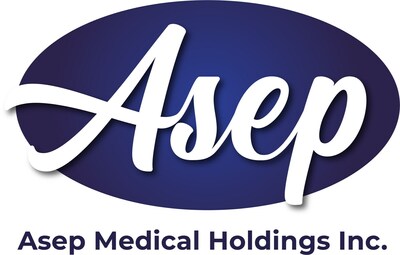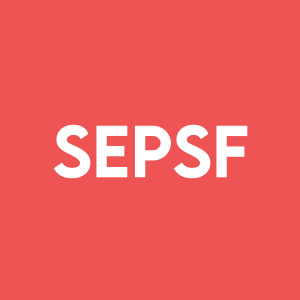Asep Inc. Obtains Exclusive Worldwide License from the University of British Columbia for Ground-breaking Medical Device Coating Technology
- Completion of the acquisition and exclusive license agreement
- High potential for growth in the medical device coatings market
- Innovative technology to prevent device-related infections
- Asep Inc. holding 88% of the issued and outstanding shares of SafeCoat
- None.
Insights
Analyzing...
Device-related infections are responsible for a quarter of all healthcare-associated infections and are difficult to treat with conventional antibiotics due to the adherence and growth of bacterial biofilms on the surface of the device. Catheters are an excellent example of medical instruments that can cause serious infections. According to the Center for Disease Control and Prevention (CDC), approximately
The Technology encompasses two critical aspects to prevent device-related infections, which cause an additional cost of
According to Research and Markets Medical Device Coatings: Global Markets report, the estimated value of medical device coatings in 2022 was USD
- An ageing population is driving an increased demand for medical devices
- Advancements in technology have led to the development of new medical devices that require coatings
- The rising incidence of chronic diseases, such as heart disease and diabetes, is driving demand for medical devices that can be used for long-term treatment
- Along with scientific and technological advances, the FDA and other regulatory bodies have developed strict requirements to increase patient safety by improving the safety and performance of medical devices, which has led to an increased demand for coatings that can meet those requirements
- Medical device coatings can be cost-effective in the long run by prolonging the life of the device or by reducing the need for frequent replacement4
"We are excited to take this promising new technology forward through SafeCoat Medical and the exclusive worldwide license from UBC. We anticipate that this transaction will create significant new market opportunities as we tackle the problem of maintaining sterile surfaces on medical devices and implants," stated Tim Murphy, Asep Inc.'s Chief Operating Officer.
Pursuant to the Agreement, Asep Inc. will hold
The term of the Agreement will expire on the later of 20 years from the grant of the license and the expiry date of the last of the patents relating to the Technology. In consideration for the granting of the license, SafeCoat will pay a royalty to UBC on the revenue generated from the commercialization of the Technology products by SafeCoat at a rate of
Dr. Hancock, the CEO and a director of the Company is a party to the License Agreement as he is one of the non-waiving inventors; as such, the portion of the transaction with Dr. Hancock is considered to be a "related party" within the meaning of Multilateral Instrument 61-101 Protection of Minority Security Holders in Special Transactions ("MI 61-101") and the proposed issuance to Dr. Hancock of common shares of SafeCoat Medical Inc., a subsidiary of the Company, is considered to be a "related party transaction" within the meaning of MI 61-101. These related party transactions are exempt from the valuation requirement of MI 61-101 by virtue of the exemption contained in section 5.5(b) as the Company's shares are not listed on a specified market and from the minority shareholder approval requirements of MI 61-101 by virtue of the exemption contained in section 5.7(a) of MI 61-101 in that the fair market value of the consideration of the shares to be issued to each related party does not exceed
ABOUT ASEP MEDICAL HOLDINGS INC.
Asep Medical Holdings Inc. (www.asepmedical.com) is dedicated to addressing the global issue of antibiotic failure by developing novel solutions for significant unmet medical needs in human medicine. The Company is a consolidation of three existing private companies, all with technology in advanced development — Sepset Biosciences Inc. (proprietary diagnostic tools to enable the early and timely identification of sepsis), ABT Innovations Inc. (broad-spectrum therapeutic agents to address multi-drug resistant biofilm infections), and SafeCoat Medical Inc. (an antibacterial peptide medical device coating technology).
Sepset Biosciences Inc. (www.sepset.ca) is in the final stages of preparation for clinical studies and commercialization of an in vitro diagnostic test that involves a patient gene expression signature that helps assess the development of severe sepsis, one of the significant diseases leading to antibiotic failure since antibiotics are the primary initial treatment for sepsis. Sepsis was responsible for nearly
ABT Innovations Inc.'s (www.abtinnovations.ca) peptide technology covers a broad range of therapeutic applications, including bacterial biofilm infections (dental, wound, sinusitis, skin, medical device infections, chronic infections, lung, bladder, ear-nose and throat, orthopaedic, etc.), anti-inflammatories, anti-infective immune-modulators and vaccine adjuvants. The company is in the pre-clinical development phase with promising data for the first three indications.
SafeCoat Medical Inc.'s (www.safecoatmedical.com) technology encompasses anti-fouling self-assembling polymers combined with conjugated antimicrobial peptides, which can be applied to various surfaces as antimicrobial and anti-fouling coatings. In particular, the invention relates to coatings that may be applied to multiple medical devices and implants, and feasibility has been demonstrated in animal models. The company's expertise also encompasses the methods for manufacturing and applying these anti-bacterial coatings.
FORWARD-LOOKING STATEMENTS —
This news release contains certain "forward-looking statements" within the meaning of such statements under applicable securities law. Forward-looking statements are frequently characterized by words such as "anticipates," "plan," "continue," "expect," "project," "intend," "believe," "anticipate," "estimate," "may," "will," "potential," "proposed," "positioned" and other similar words, or statements that certain events or conditions "may" or "will" occur. These statements include but are not limited to the successful clinical testing of our Sepsis in vitro diagnostic test and its intended filing for regulatory market authorization; the Company not receiving regulatory market authorization as planned or at all; the undertaking of pre-clinical studies on our lead therapeutic, with the expectation that this will lead to fast-track clinical trials; the timeframe for identification of sepsis with the company's products; the potential opportunities for the generation of revenue; the therapeutic benefits of the company's products; and other statements regarding the company's proposed business plans. Various assumptions were used in drawing conclusions or making the predictions contained in the forward-looking statements throughout this news release. Forward-looking statements are based on the opinions and estimates of management at the date the statements are made and are subject to a variety of risks including the risk that the company's products may not perform as expected; that the company may not receive the requisite regulatory market authorization or results of testing; the Company's testing of the products may not be successful and market authorization may not be obtained in the estimated timelines or at all; the company may not be able to generate revenue from its products as expected or at all; the market for the company's products may not be as described in this news release; and various other risk factors identified in the Asep Medical Inc.'s prospectus dated November 9, 2021, and in the company's management discussion and analysis, available for review under the Company's profile at www.sedar.com and uncertainties and other factors that could cause actual events or results to differ materially from those projected in the forward-looking statements. Asep Medical Inc. is under no obligation and expressly disclaims any intention or obligation to update or revise any forward-looking statements, whether as a result of new information, future events or otherwise, except as expressly required by applicable law.
ENDNOTES |
![]() View original content to download multimedia:https://www.prnewswire.com/news-releases/asep-inc-obtains-exclusive-worldwide-license-from-the-university-of-british-columbia-for-ground-breaking-medical-device-coating-technology-301891873.html
View original content to download multimedia:https://www.prnewswire.com/news-releases/asep-inc-obtains-exclusive-worldwide-license-from-the-university-of-british-columbia-for-ground-breaking-medical-device-coating-technology-301891873.html
SOURCE ASEP Medical Holdings Inc.








